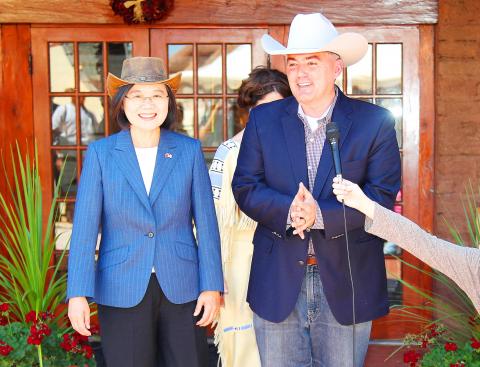Next year’s presidential election is a choice between value systems and ways of life, and the sustainability of democracy and freedom, President Tsai Ing-wen (蔡英文) said on Saturday.
After concluding a state visit to the nation’s four Caribbean allies on Friday, Tsai made a two-night stopover in Denver, Colorado, on her way home and held an informal meeting with reporters accompanying her delegation.
Commenting on foreign media reports that next year’s presidential and legislative elections would be a battle between pro-China and pro-US camps, Tsai said she sees the elections as “a choice between value systems and ways of life.”

Photo: CNA
Taiwan is a democratic society and its voters are focused on the nation’s future, especially whether its democratic way of life and freedom can be sustained, said Tsai, of the Democratic Progressive Party (DPP), who is running for re-election.
“We hope for peace and stability when handling cross-strait relations, we also hope that China will understand the hopes and priorities of Taiwanese that are expressed in each general election,” she added.
Asked about possible presidential challenges by the pro-independence Formosa Alliance or by Taipei Mayor Ko Wen-je (柯文哲), Tsai said that she aims to forge a coalition of supporters of Taiwan and the Republic of China.
The Formosa Alliance has organized itself into a political party, but has yet to nominate a presidential candidate. Ko has said he would announce next month whether he would run for president.
Regarding a running mate, Tsai said that the political situation is still developing and the DPP would hold a discussion later.
“Our objective remains to create the best and most competitive ticket for 2020,” she added.
During her trip to the Caribbean, interacting with local people and witnessing Taiwan’s assistance to its allies, such as helping Saint Lucia eradicate a disease that damaged banana crops, moved her, Tsai said.
American Institute in Taiwan Chairman James Moriarty also attended Tsai’s meeting with the press, and she thanked the US government for helping on her Caribbean trip.
Asked if she thought Taiwan would become a bargaining chip in US President Donald Trump’s re-election campaign next year or in US-China trade negotiations, Tsai said she would not comment on US domestic politics.
However, she believes Taiwan has the support of Americans and US political parties, she said.
Taiwan should have its own strategies and ideas based on its interests, and continue its cooperation and positive relations with the US, Tsai said.
Tsai on Saturday also visited the US National Center for Atmospheric Research in Boulder, Colorado.
She was welcomed by center director Everette Joseph, a group of Taiwanese scientists working at the facility and Taiwanese students in the area.
The center and Taiwanese scientists developed Formosat-7, the second satellite constellation jointly built by Taiwan and the US after Formosat-3.
She visited the Earth Observing Laboratory, one of the center’s seven laboratories, where she was given a tour of research aircraft.
Tsai later had lunch with US Senator Cory Gardner, who represents Colorado.
She is scheduled to arrive home today.

Tropical Storm Gaemi strengthened into a typhoon at 2pm yesterday, and could make landfall in Yilan County tomorrow, the Central Weather Administration (CWA) said yesterday. The agency was scheduled to issue a sea warning at 11:30pm yesterday, and could issue a land warning later today. Gaemi was moving north-northwest at 4kph, carrying maximum sustained winds near its center of up to 118.8kph and gusts of 154.8kph. The circumference is forecast to reach eastern Taiwan tomorrow morning, with the center making landfall in Yilan County later that night before departing from the north coast, CWA weather forecaster Kuan Shin-ping (官欣平) said yesterday. Uncertainty remains and

SEA WARNING LIKELY: The storm, named Gaemi, could become a moderate typhoon on Wednesday or Thursday, with the Taipei City Government preparing for flooding A tropical depression east of the Philippines developed into a tropical storm named Gaemi at 2pm yesterday, and was moving toward eastern Taiwan, the Central Weather Administration (CWA) said. Gaemi could begin to affect Taiwan proper on Tuesday, lasting until Friday, and could develop into a moderate typhoon on Wednesday or Thursday, it said. A sea warning for Gaemi could be issued as early as Tuesday morning, it added. Gaemi, the third tropical storm in the Pacific Ocean this typhoon season, is projected to begin moving northwest today, and be closest to Taiwan on Wednesday or Thursday, the agency said. Today, there would likely

DISRUPTIONS: The high-speed rail is to operate as normal, while several airlines either canceled flights or announced early departures or late arrivals Schools and offices in 15 cities and counties are to be closed today due to Typhoon Gaemi, local governments announced last night. The 15 are: Taipei, New Taipei City, Taoyuan, Tainan, Keelung, Hsinchu and Kaohsiung, as well as Yilan, Hualien, Hsinchu, Miaoli, Chiayi, Pingtung, Penghu and Lienchiang counties. People should brace for torrential rainfall brought by the storm, with its center forecast to make landfall on the east coast between tonight and tomorrow morning, the Central Weather Administration (CWA) said. The agency issued a sea warning for the typhoon at 11:30pm on Monday, followed by a land warning at 11:30am yesterday. As of

CASUALTY: A 70-year-old woman was killed by a falling tree in Kaohsiung as the premier warned all government agencies to remain on high alert for the next 24 hours Schools and offices nationwide are to be closed for a second day today as Typhoon Gaemi crosses over the nation, bringing torrential rain and whipping winds. Gaemi was forecast to make landfall late last night. From Tuesday night, its outer band brought substantial rainfall and strong winds to the nation. As of 6:15pm last night, the typhoon’s center was 20km southeast of Hualien County, Central Weather Administration (CWA) data showed. It was moving at 19kph and had a radius of 250km. As of 3pm yesterday, one woman had died, while 58 people were injured, the Central Emergency Operation Center said. The 70-year-old